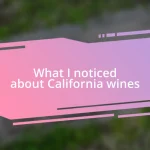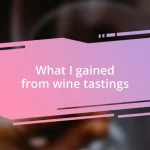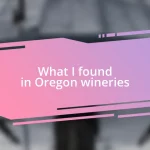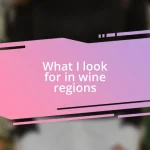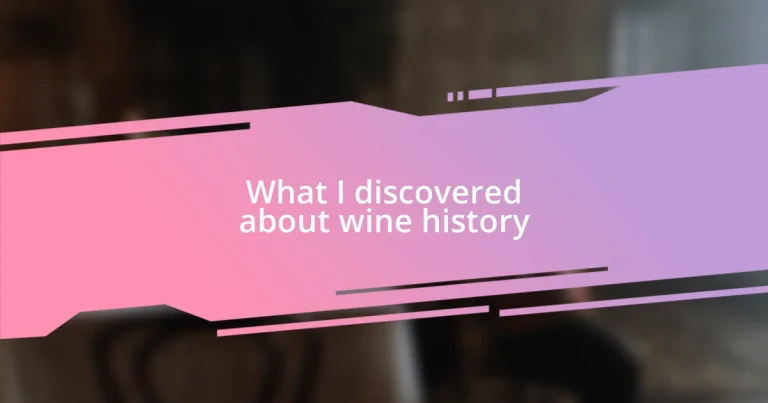Key takeaways:
- The earliest evidence of wine production dates back to 6000 BC in modern-day Georgia, marking the accidental discovery of fermentation and its cultural significance.
- Ancient civilizations, such as the Egyptians and Greeks, revered wine as a symbol of divinity and social unity, intertwining it with their social rituals and religious practices.
- Major developments in wine production, including the influence of monasteries during the Middle Ages and advancements in technology and science in the 19th century, have shaped modern winemaking and appreciation.
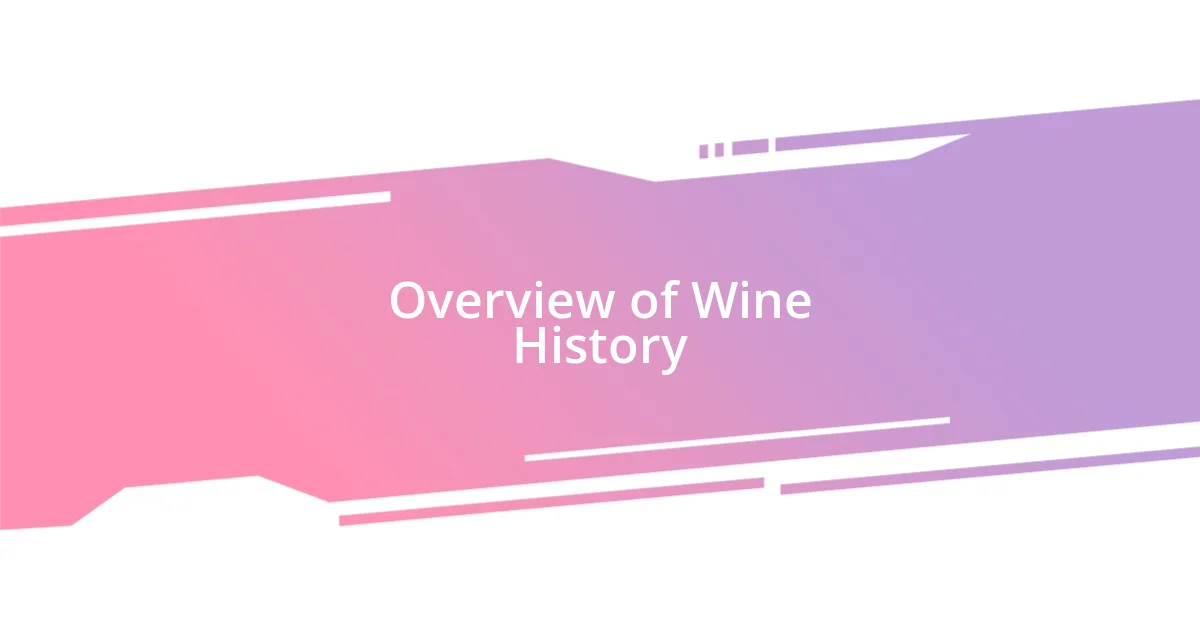
Overview of Wine History
Wine has a fascinating history that dates back thousands of years, offering a rich tapestry of culture and tradition. Did you know that some of the earliest evidence of wine production was found in regions of modern-day Georgia, dating as far back as 6000 BC? Isn’t it remarkable to think about how our ancestors discovered fermentation and began crafting this beloved beverage?
As I delved deeper into wine history, I was captivated by the role of ancient civilizations like the Egyptians and the Greeks, who not only enjoyed wine but invested in its cultivation and even incorporated it into their religious practices. It’s intriguing to imagine how wine was intertwined with social rituals, family gatherings, and celebrations – aspects that still resonate today. Have you ever thought about what it would be like to share a glass of wine at a feast in ancient times?
During the Middle Ages, wine production saw a shift with the influence of monasteries, where monks meticulously refined techniques, preserving wine knowledge during turbulent times. It makes me reflect on how wine has remained a source of solace and community throughout history, bringing people together even during challenges. Doesn’t it make you appreciate each sip even more, knowing it carries centuries of stories?
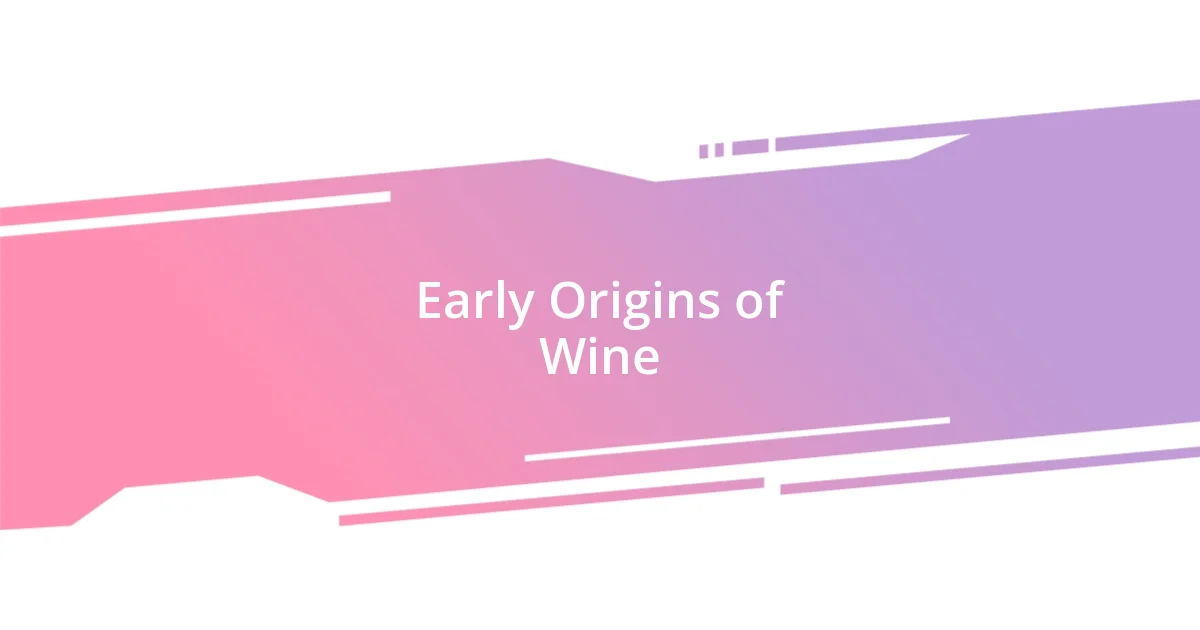
Early Origins of Wine
The early origins of wine are deeply rooted in the very fabric of human culture. The discovery of fermented grape juice in ancient Georgia, around 6000 BC, is a captivating starting point. I often picture the first humans stumbling upon this natural process by sheer accident—grapes left to ferment in the warmth of the sun, resulting in a transformative elixir. It’s fascinating to think how a simple fruit could spark such a monumental shift in social and spiritual practices.
Here are some key points about the early origins of wine:
- Earliest Evidence: Archaeological findings in Georgia reveal pottery containing residue of wine dating back to 6000 BC.
- Cultural Significance: Wine wasn’t just a drink; it played a vital role in ceremonial rituals and social gatherings.
- Spread of Wine: As trade routes expanded, the knowledge of viticulture spread to neighboring regions, influencing various cultures.
- Fermentation Process: The accidental fermentation of grapes marked the beginning of wine as a beverage, highlighting human ingenuity.
- Symbol of Civilization: In ancient societies, wine served as a symbol of wealth, life, and divine connection, showcasing its importance beyond mere consumption.
Thinking about how civilizations evolved—crafting and refining this sacred drink—fuels my curiosity about the anthropological ties we have with wine today. Whenever I share a glass with friends, I feel that connection stretching back across thousands of years, a reminder of our shared human experience. It makes each sip feel as though I’m tasting history itself, a legacy passed down through generations.
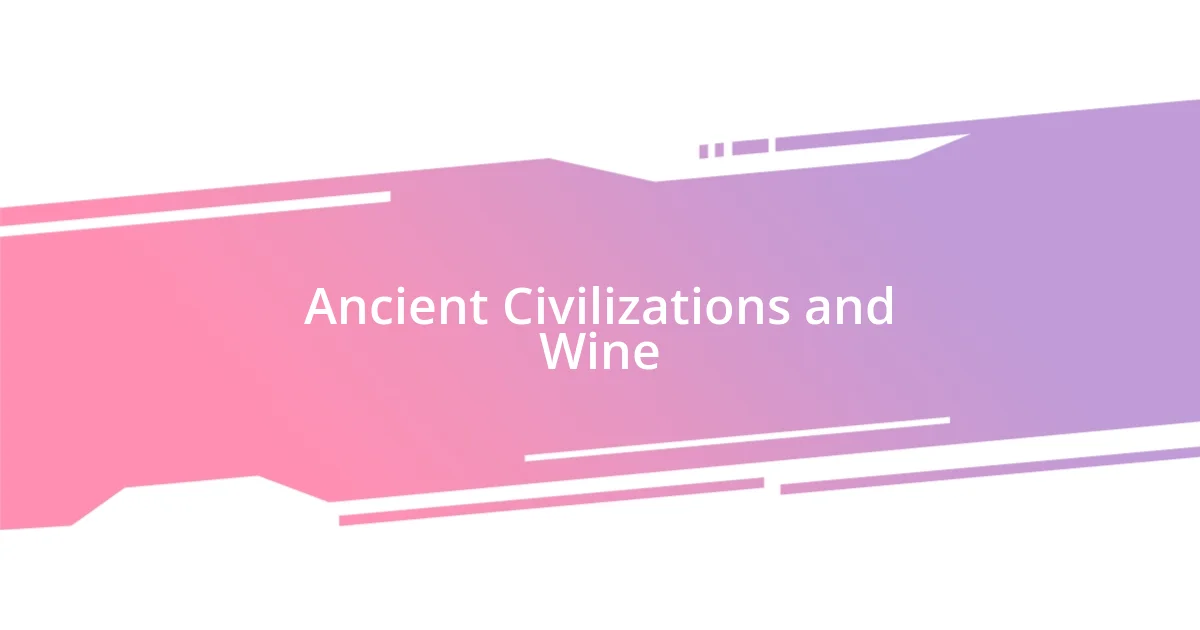
Ancient Civilizations and Wine
The relationship between ancient civilizations and wine is both profound and colorful. The Egyptians, for instance, not only produced wine but revered it, associating it with their gods and the afterlife. When I first read about their elaborate wine rituals, it struck a chord with me; the thought of wine being both a daily companion and a sacred offering is fascinating. It makes me wonder how many other cultures held similar views, intertwining their daily lives with the divine through this remarkable beverage.
In Greece, wine was practically a centerpiece of their social life, which I find particularly evocative. The Greeks celebrated Dionysus, the god of wine, with festivals that marked significant social events. The idea of gathering around a table, glasses raised in honor of not just the drink but of fellowship and storytelling conjures images of warmth and unity. I can almost picture the laughter, debate, and shared moments that surely unfolded over those cups of wine.
As civilizations like the Romans expanded, they brought their wine-making traditions with them. This exchange of ideas and practices enriched the wine culture in various regions, which I find absolutely remarkable. I often reflect on how these ancient trade routes mirror our modern-day interactions; we continue to innovate and share our experiences through wine. There’s something magical about that continuity. Each encounter with wine I have feels like a bridge to those ancient souls, each sip a connection to their stories, joys, and celebrations.
| Ancient Civilization | Wine Significance |
|---|---|
| Egypt | Used in religious rituals and daily life, symbolizing divinity and life |
| Greece | Central to social gatherings; celebrated Dionysus through festivals |
| Rome | Spread viticulture practices, enhancing regional wine-making |

Major Developments in Wine Production
One major development in wine production occurred during the Middle Ages when monasteries became the custodians of viticulture. Monks meticulously cultivated vineyards, perfecting the art of winemaking while preserving knowledge through generations. I remember visiting a centuries-old vineyard in France, where the atmosphere felt steeped in history; it was inspiring to think that those very vines had been tended by hands devoted to both faith and craft.
The introduction of the press in the 15th century revolutionized wine production, allowing for more efficient extraction of juice and creating better quality wines. I often find myself fascinated by the way technology has shaped what we drink; that simple invention transformed a labor-intensive process into a more accessible one. Can you imagine the difference it made for the average winemaker back then, enabling them to create wines that could be shared and enjoyed widely?
Fast forward to the 19th century, and we see the advent of scientific approaches to winemaking, thanks to figures like Louis Pasteur. His discoveries about fermentation processes changed everything. Understanding the science behind what makes wine great—well, it feels like opening a door to a world of possibilities. I was struck by this when I attended a workshop on terroir, where we explored how soil composition influences flavors. It further solidified my belief that each bottle tells a story, not just of the grape, but of the land and expertise that shaped it.
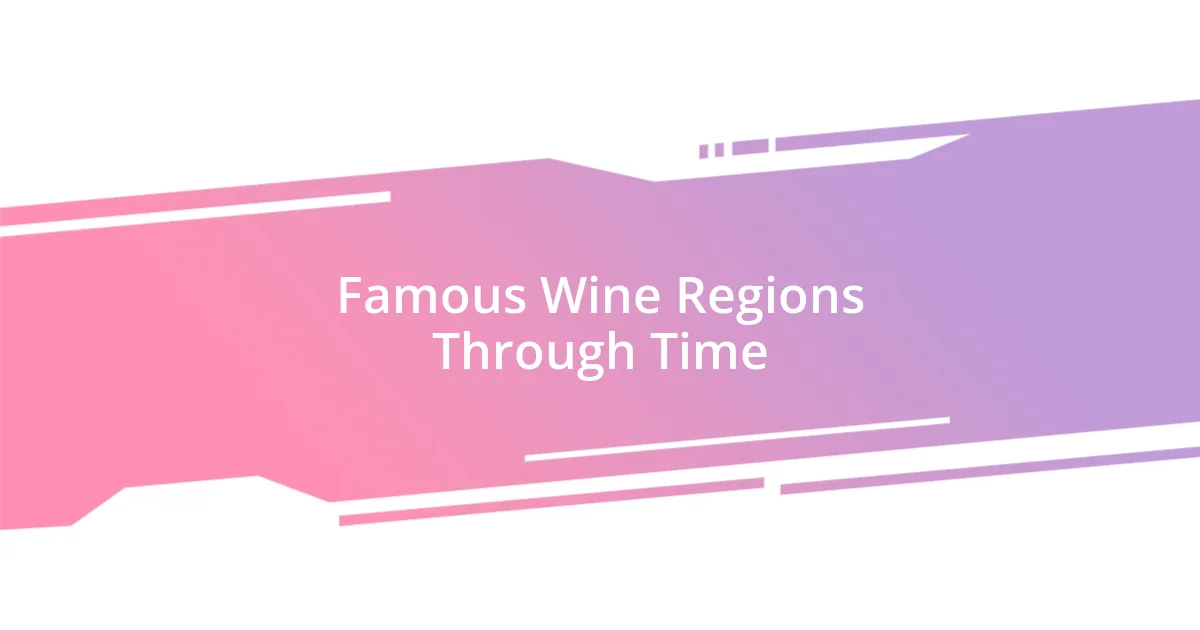
Famous Wine Regions Through Time
Famous Wine Regions Through Time
As I explore the vast landscape of wine history, I’m continually drawn to regions like Bordeaux, which has been a celebrated viticultural area since the Romans began cultivating vines there. Walking through the rolling hills of this region, I felt a deep sense of connection—not just to the beautiful scenery but to the thousands of years of tradition that have taken place among these vines. It raises the question: how many hands have touched these grapes throughout history, crafting each distinct vintage?
Then there’s Tuscany, a region that seems to embody the very essence of Italian winemaking. I’ll never forget my visit to a small family-run vineyard where the warmth of the locals matched the rich flavors of their Chianti. It struck me how the traditions here have been passed down through generations, marrying passion and technique into every bottle. This experience made me appreciate that each sip carries a story of the land and its people, weaving a narrative that spans beyond just flavor.
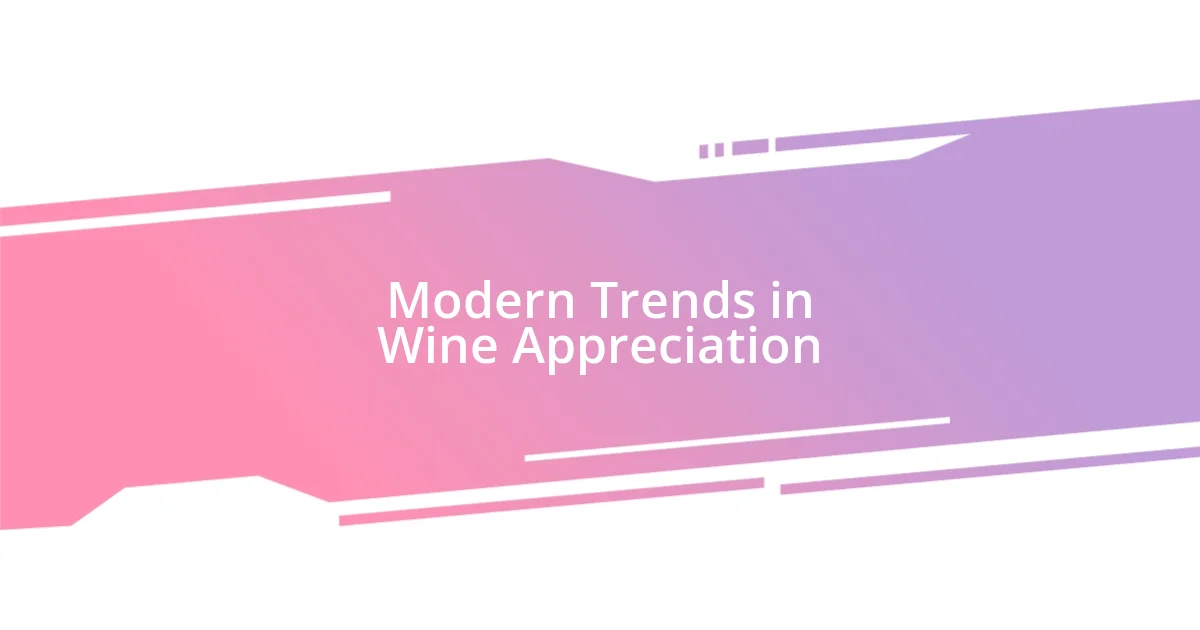
Modern Trends in Wine Appreciation
Modern wine appreciation has seen a significant shift, with consumers becoming more adventurous and informed. I recall my first experience at a natural wine festival; it opened my eyes to a world of organic and biodynamic wines that prioritized sustainability. The diversity in flavors and winemaking philosophies left me feeling excited about exploring wines without the constraints of convention. Have you ever tried something so different that it completely reshaped your understanding of a category?
Social media has also transformed how we talk about and connect with wine. Platforms like Instagram encourage a visual narrative of the wine experience, bringing together a community of enthusiasts who share not just their favorite bottles but also the stories behind them. I’ve found myself scrolling through posts, captivated by the beautiful aesthetics of wine pairing ideas and vineyard visits. It feels like we’re all part of a larger conversation now, where each shared post contributes to a collective appreciation for this age-old craft.
Moreover, educational experiences are gaining traction, with wine tastings evolving into immersive classes that dive deep into regional histories, production methods, and flavor profiles. I remember attending a masterclass that focused solely on the interplay between climate and wine – it was like stepping into an entirely new realm of understanding. These moments remind me how enriching it is to combine learning and tasting, transforming a simple sip of wine into an exploration of culture and science. Isn’t it fascinating how appreciation can grow when we dig deeper into the stories behind each bottle?



